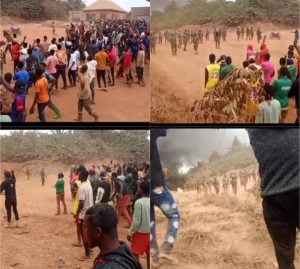The tranquil community of Manso Aboabo in Ghana’s Ashanti Region has been shattered by a violent clash between local youth and military officers, triggering an exodus of residents and students. The confrontation erupted after the tragic death of Assembly Member Samuel Dankwa, who was allegedly shot by soldiers while attempting to mediate a dispute between the youth and Asanko Mines. The incident sparked outrage and retaliatory actions by residents, who targeted mining equipment belonging to the company, escalating tensions and prompting a heavy military response. This intervention further inflamed the situation, causing widespread panic and forcing dozens to flee their homes in search of safety in neighboring communities. The incident has left the community deeply traumatized and underscores the fragile relationship between local populations and mining operations in the region.
The underlying tension stems from a long-standing conflict between the community and Asanko Mines regarding land ownership and resource control. Residents have long accused the mining company of encroaching on their ancestral lands and failing to adequately compensate them for the environmental and social impact of its operations. The death of the Assembly Member, who was a respected figure in the community, became the catalyst that ignited the simmering resentment. His attempt to mediate a peaceful resolution tragically ended in his own death, fueling the anger and frustration of the residents, who perceived the military’s actions as excessive and biased towards protecting the interests of the mining company.
The heavy-handed response by the military has further aggravated the situation, turning a local dispute into a full-blown crisis. Residents describe scenes of chaos and fear as armed soldiers stormed the town, allegedly firing indiscriminately and causing panic among the populace. This forceful approach has not only failed to quell the unrest but has instead deepened the distrust between the community and the authorities. The ensuing exodus of residents, including students, highlights the severity of the situation and the urgent need for de-escalation and a peaceful resolution. The incident has also disrupted daily life, impacting education, businesses, and the overall sense of security in the community.
Hon. Tweneneboah Kodua Forkuo, the Member of Parliament for Manso Nkwanta, has strongly condemned the military’s actions and called for their immediate withdrawal from the area. He argues that their presence is exacerbating tensions and hindering efforts to restore calm and initiate a meaningful dialogue. He has also petitioned Parliament and the Presidency to launch a thorough and independent investigation into the incident, demanding justice for the bereaved families and accountability for those responsible for the Assembly Member’s death. His appeal reflects the widespread sentiment within the community and the growing demand for transparency and justice in the face of alleged military misconduct.
The incident at Manso Aboabo exposes the complex and often volatile dynamics between mining companies, local communities, and security forces in resource-rich regions. It highlights the need for more effective mechanisms for conflict resolution, greater transparency in mining operations, and a genuine commitment to addressing the concerns and grievances of local populations. The heavy-handed response by the military underscores the dangers of prioritizing corporate interests over the rights and well-being of communities, and emphasizes the importance of establishing robust safeguards to prevent such tragedies from occurring in the future.
Moving forward, a comprehensive and impartial investigation is crucial to establish the facts of the incident and hold those responsible accountable. The government must also prioritize dialogue and reconciliation between the community and Asanko Mines to address the underlying issues that fueled the conflict. This includes ensuring fair compensation for land acquisition and environmental damage, promoting local participation in decision-making processes, and establishing mechanisms for grievance redressal. Furthermore, the role of the military in such situations needs to be carefully reviewed to ensure that their actions are proportionate, respect human rights, and contribute to de-escalation rather than further inflaming tensions. Ultimately, a sustainable solution requires a commitment to building trust and fostering a mutually beneficial relationship between all stakeholders, prioritizing the well-being and security of the affected communities.














